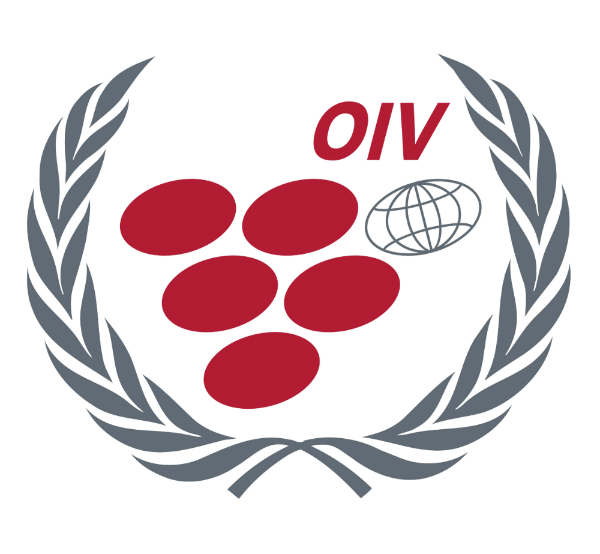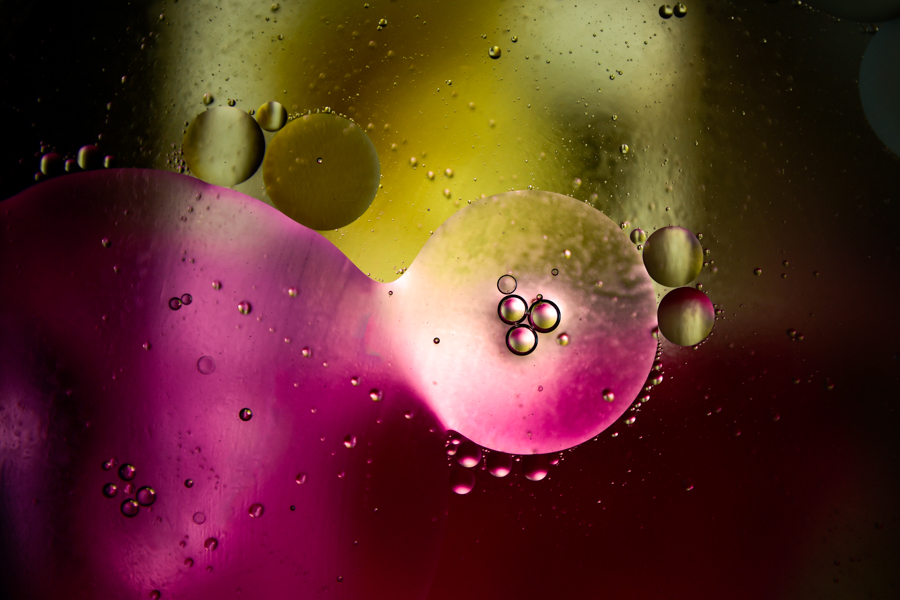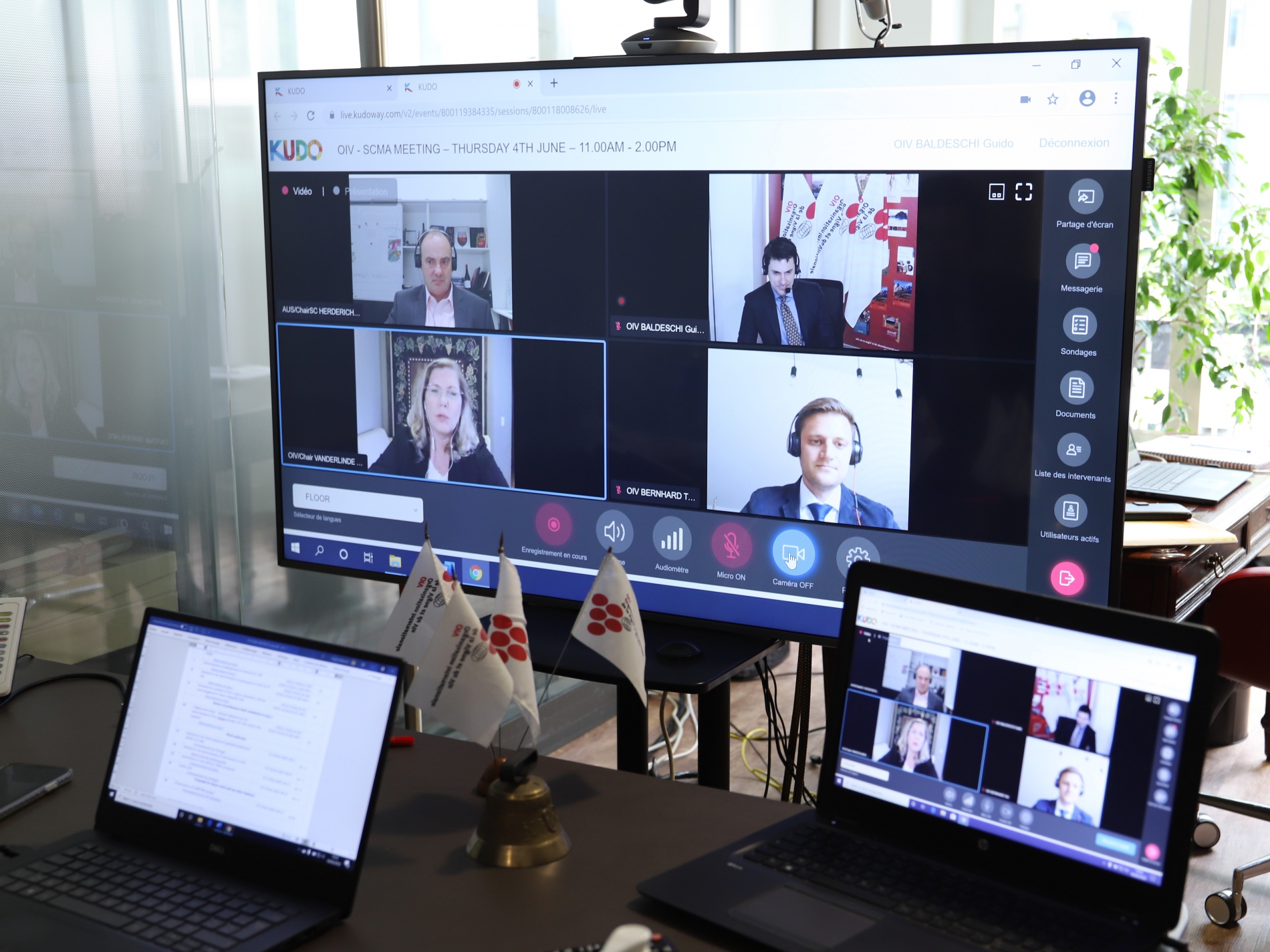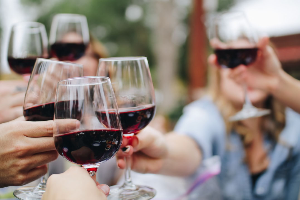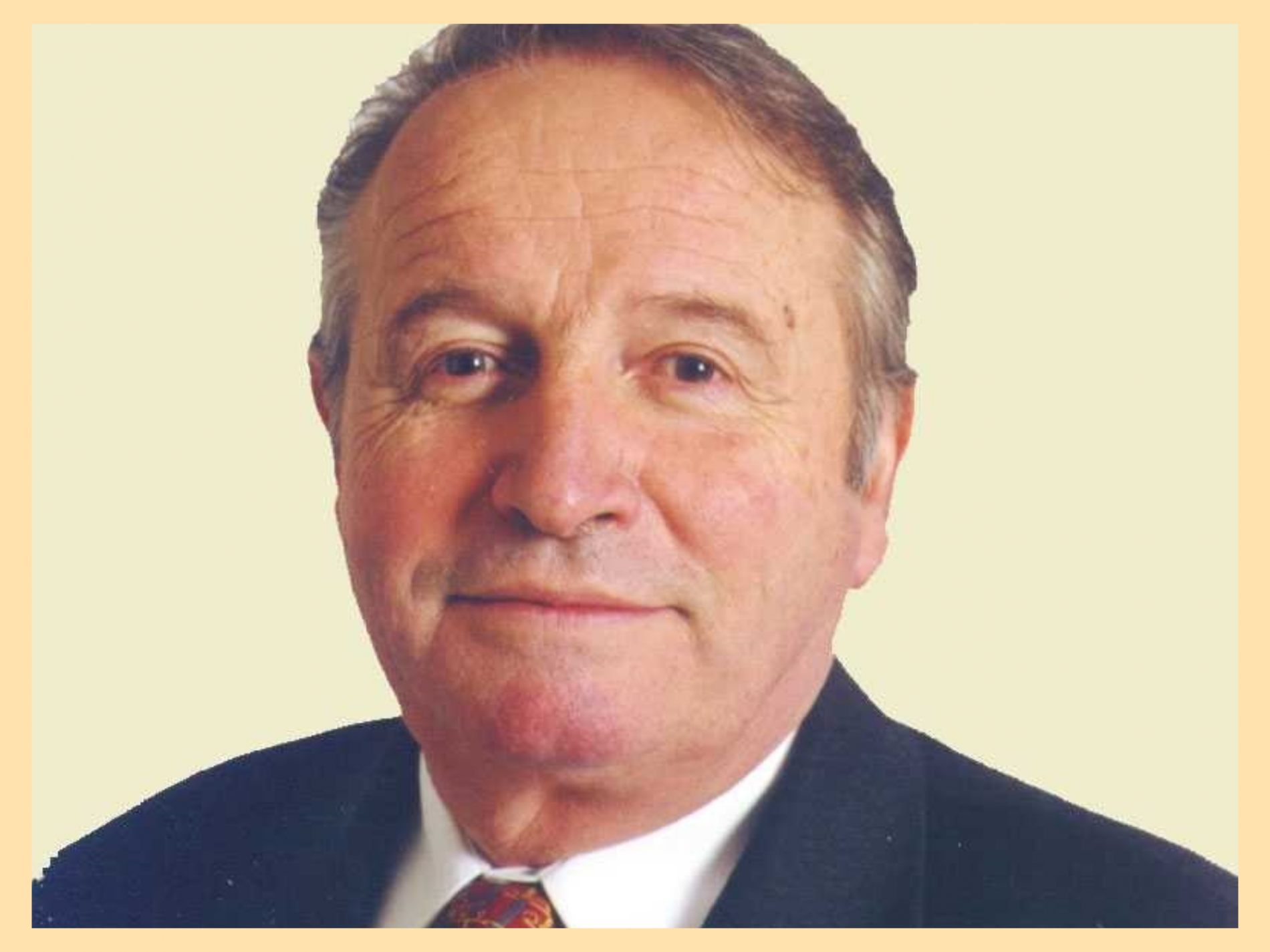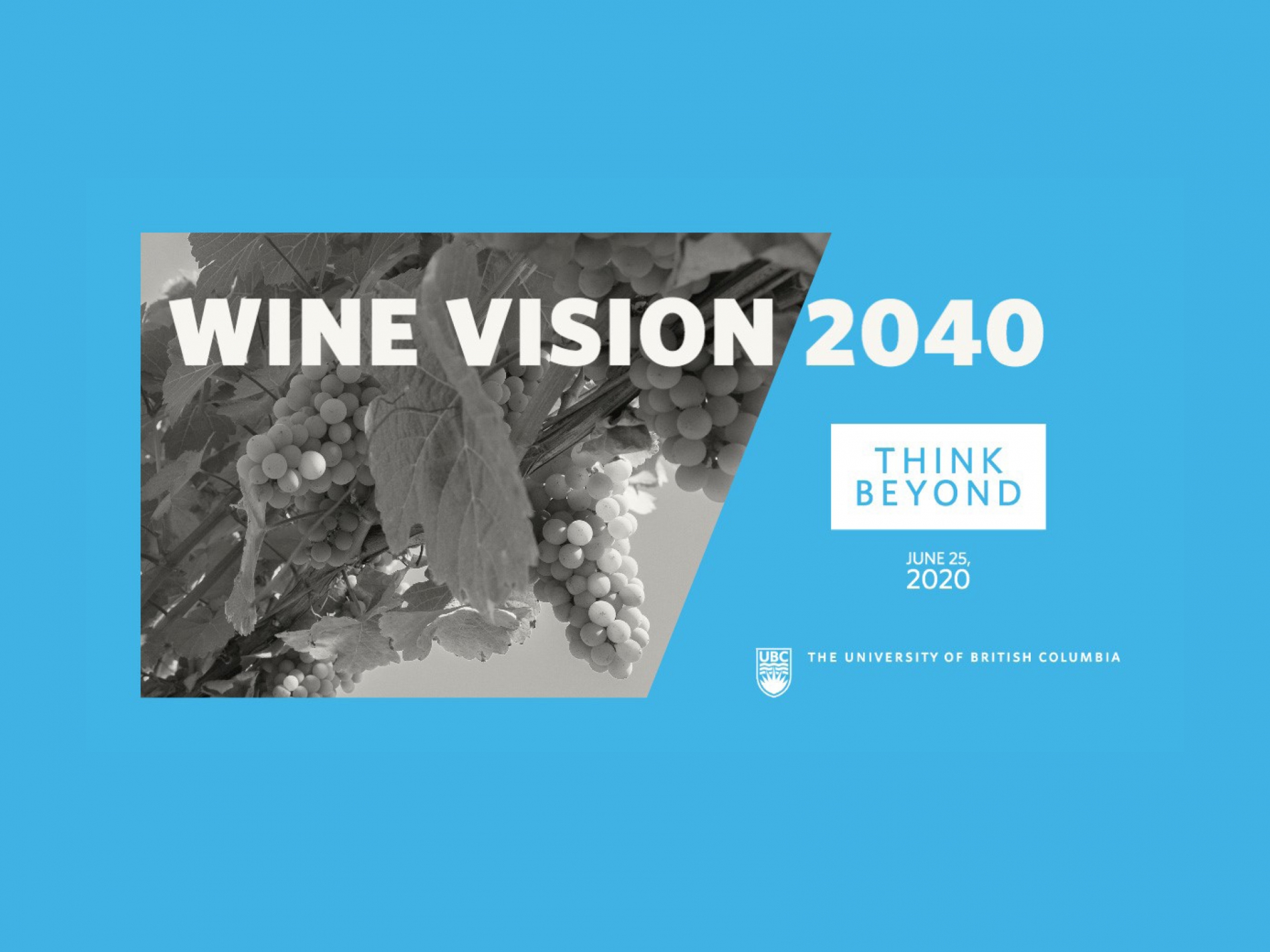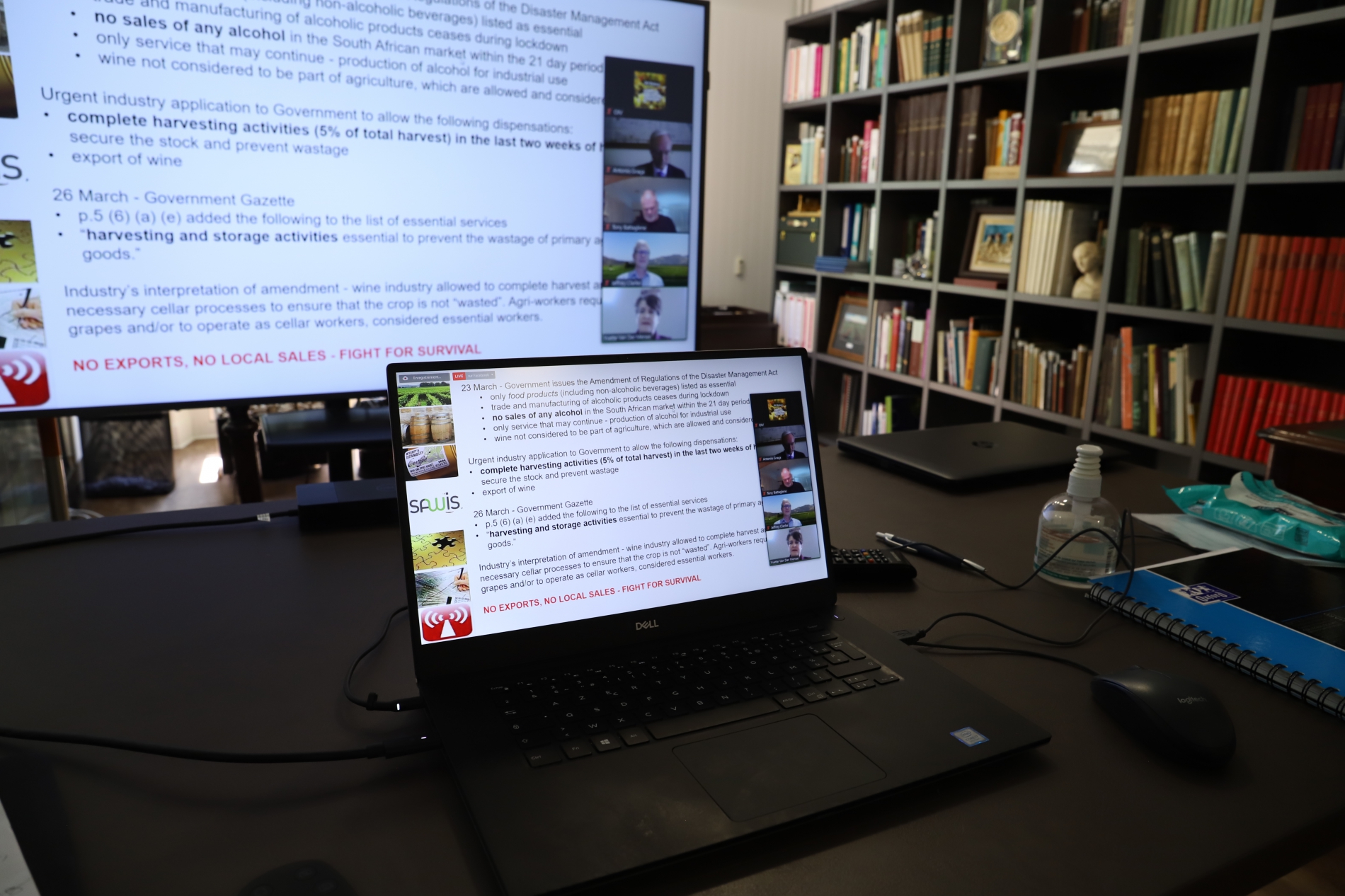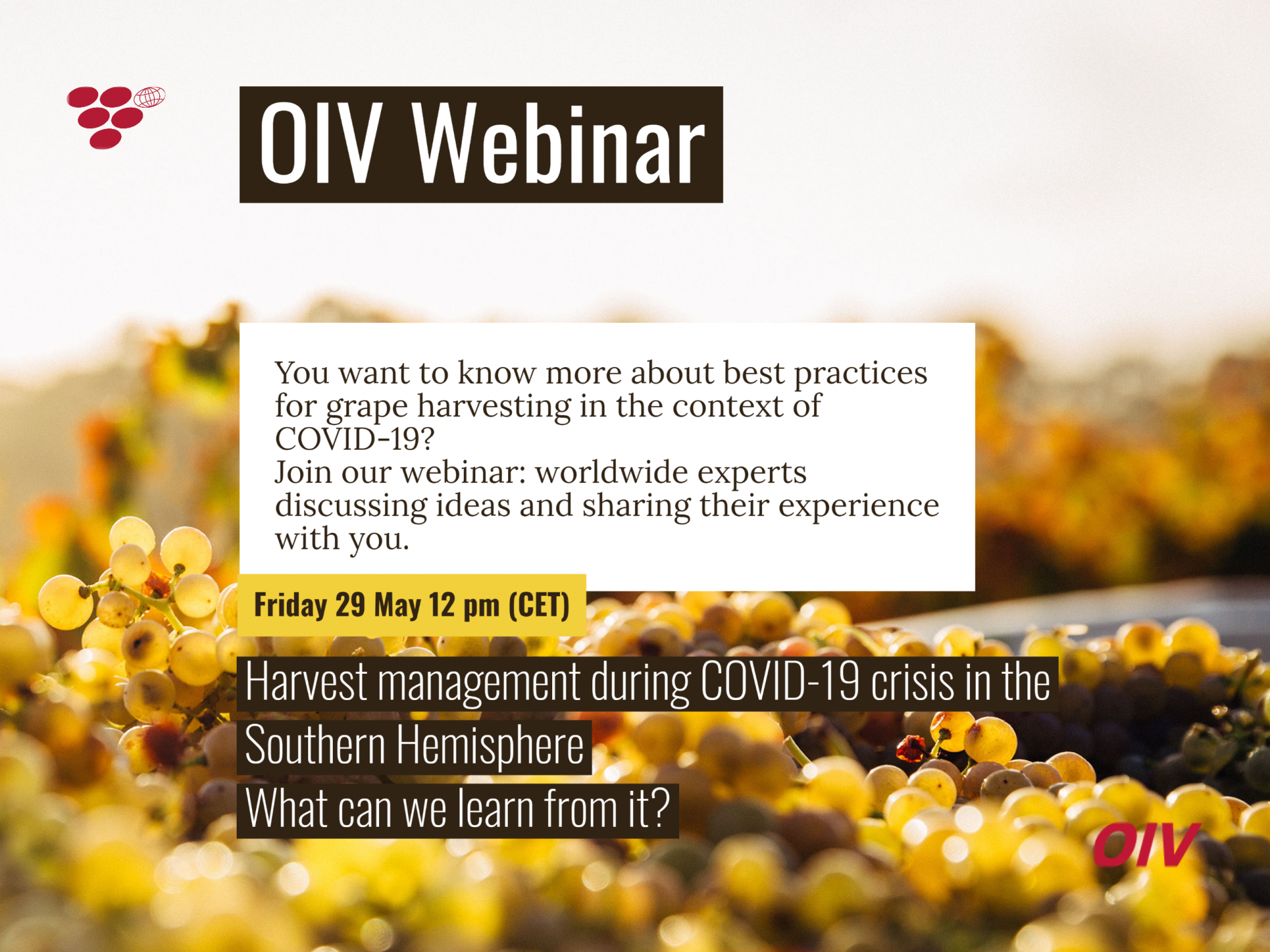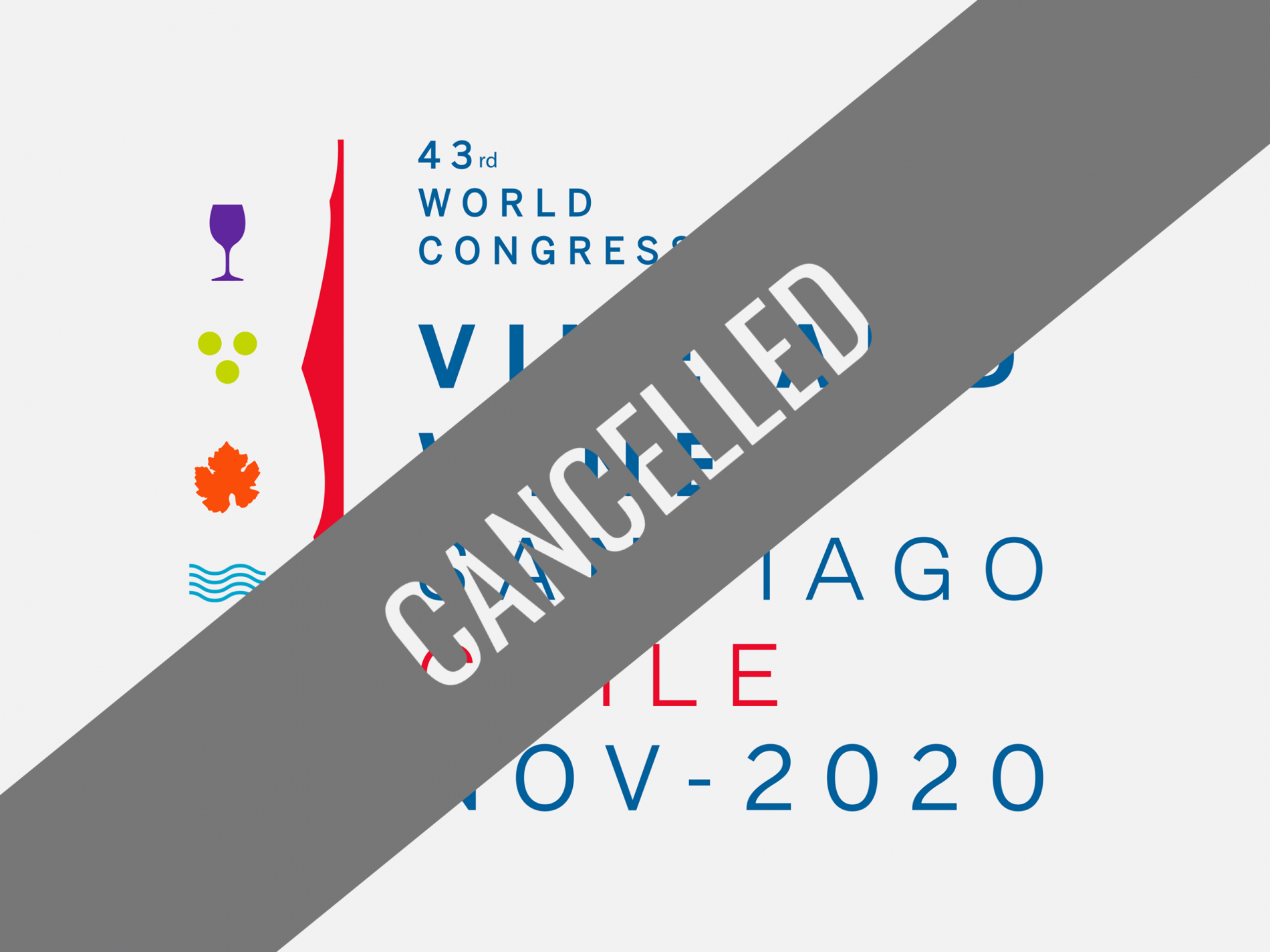26 авг 2020
OIV Awards: information and the registration form of the 2021 Edition are available here.Registrations: September 1, 2020 - February 28, 2021● Paper printed books in the 11 categories.● Interactive digital Tool (Websites, Webformation) in the categories: Viticulture and Sustainable Vitiviniculture, Oenology, Vitivinicultural Economy and Law, History, Literature and Fine Arts, Wine and Health.Magazines, commercial guides and commercial Websites are not accepted.For any question: jurydesprix@oiv.int
26 июл 2020
2020 - OIV Research grant program in support of priority programme fieldsAll information here.
26 июл 2020
In the interests of best serving the Member States that make up the International Organisation of Vine and Wine, the responses were analysed and sent to the platform in question, to improve this service for potential future virtual meetings. Here is the analysis and proposed explanation. Out of the 150 responses obtained (37%), users indicated that, overall, they were satisfied, with an average rating of 8/10. Over the 22 meetings of the 4 Commissions and Sub-Commissions, almost half of the experts (48%) participated in 2-5 meetings. In cross-analysing the responses to questions 1 and 4, it can be observed that the difficulty in using the platform decreases drastically as the number of uses increases. The OIV had drawn up a user guide beforehand to prepare attendees as best as possible, with a list of steps to follow to ensure meetings are conducted properly. The relevance and usefulness of this approach will be re-evaluated based on the average rating, which was 8/10.Points to be improvedThere were some shortcomings encountered when joining and participating: 41% of respondents had issues connecting to the internet, 31% had sound problems and 10% had camera problems. Additionally, 16% of the experts found the KUDO platform difficult to use: as an example, 11% of experts had difficulty requesting access to the floor (space to speak). As a reminder, requesting to speak on KUDO entails two steps: first, a request to speak from the expert, and second, the moderator's acceptance so that the expert may appear on the floor and speak. Due to the way it functions, the KUDO platform can host up to 5 people on the floor at any one time. Nevertheless, the absence of visibility during meetings was a concern for 20% of experts surveyed. The limitation on the number of people is due to the bandwidth required by KUDO, and it was the OIV’s decision to treat the floor in the same way as during in-person meetings.Other minor problems were indicated, such as the time window for meetings (8%), a lost password (9%) or firewalls blocking KUDO (9%), and these should also be kept in mind for the future. However, despite the difficulties encountered, 83% of the experts surveyed agreed that these technical problems were resolved efficiently by the technical team available to them. Indeed, the problems experienced by each participant were continually monitored throughout the month of meetings. Strengths of the platformAt the same time, there were some notable advantages that emerged from using this platform for the spring meetings. The availability of simultaneous interpreting was welcomed by 83% of respondents. Indeed, the KUDO platform enabled experts to follow the meetings in the 5 official languages of the OIV – an essential prerequisite that was decisive in the OIV's decision to use KUDO. The possibility of joining meetings from their country of origin was one of the main advantages for 68% of those surveyed. Holding virtual meetings not only allowed for progress to be made on the work, with 18 resolutions being advanced to step 7, but also resulted in a 56% increase in expert participation between 2019 and 2020. Despite the absence of direct contact, the vast majority of participants indicated they were generally satisfied (7/10) with the capacities for interaction and requesting the floor provided by this platform.There was an open question at the end of the first part of the questionnaire, where the experts were invited to make suggestions to improve future OIV meetings on the platform. The OIV took careful note of the 85 responses received and sent these comments to KUDO. The main trends that emerged relate to optimisation of the chat (direct channel with the operator, more clarity in private chats, etc.), the need to clearly identify who is speaking, and the sometimes-lengthy registration process. Some respondents suggested also using the platform for the electronic working groups in order to get better acquainted with it. The OIV expert profile and cross-analysed trendsA second, optional questionnaire was made available to draw up a portrait of the typical user during the June meetings. The typical expert worked from home (59%) on a professional computer (64% [57% specifically on a laptop]) that was less than 3 years old (42%). A total of 86% of users ran Windows and 91% used Google Chrome as their browser. WiFi connection was preferred (57%) and 43% used fibre optic. The accessories used were mainly components built into their computer, with 86% having an integrated camera and 39% integrated audio. However, 39% also used a headset. Finally, among the people who did not participate in the meetings, 53% cited lack of time as their reason for not joining, rather than technical issues. Cross-analysing data to create this profile has enabled us to understand the origin of some failures. For example, use of the Chrome browser was necessary for fluidity of speech. The first graph shows that only 13% of experts who used this browser had problems with requests to speak, compared with 60% of those using Firefox. In the same vein, people using 4G had many more connection problems (66%) than those using cable or fibre optic (38% respectively). Finally, many sound and video issues can be explained by an absence of use of appropriate hardware devices: for example, the use of an external headset reduced the citing of sound problems from 37% to 16%. Following a debrief meeting with KUDO and the questionnaire feedback, a second document will be drawn up with the specifics of points to be solved before the next meetings. Click here to see the meetings in pictures!
26 июл 2020
Based on The Global Burden of Disease Study (GBD), a comprehensive worldwide observational epidemiological study which describes mortality and morbidity from major diseases, injuries and risk factors to health, the expert from Wine Information Council made a presentation on the importance to critical analyse scientific publications and the importance to put the findings into perspective and context.When analysing alcohol consumption, it is important to put the results in the context of diet and lifestyle. We don't drink alcohol strictly speaking, but we drink beer, wine, spirits, and we don't just drink but we eat also. There are other factors that affect our health. In a word, we need to look at the context and not just the consumption of alcohol. It is indeed important to consider lifestyle factors. For example, whether you drink moderately or occasionally is important; whether you drink with or without meals, the type of drink, diet, smoking and physical activity, as well as socio-economic status must be taken into account when considering alcohol consumption. During the expert meeting, the importance of a critical analysis of scientific publications was widely discussed. The experts will begin to prepare a document on the evaluation of the advantages and disadvantages of different epidemiological models and their relevant limitations for the interpretation of their results. The expert group will also launch a new axis of work to determine whether there is a difference between the effect of alcohol, and of wine in particular, on consumption if it is studied in isolation or as part of a diet. This is an important part of the research that needs to be developed. There appear to be advantages to considering food patterns rather than individual nutrients or foods in isolation. Foods are not consumed separately and their health effects are additive or even synergistic. For any further information you can contact Barbara Iasiello Head of Unit « Safety & Health » sanco@oiv.int It is indeed important to consider lifestyle factors
26 июл 2020
Due to the pandemic impacting us all, our organisation recently held these meetings online for the first time. Inevitably, the current health crisis has taken a prominent place. The expert groups ECOMAR (Economic Analysis, Markets and Consumption) and STATCO (Situation and Statistics) were invited to answer a questionnaire on the impacts of this crisis. The main wine-growing countries (about 15) answered and the results were presented at the meetings held throughout June.In this article we summarise the main outcomes of the questionnaire, as identified and discussed by OIV experts. The summary of conclusions is provided by Françoise Brugière, the Vice President of the ECOMAR group. Françoise Brugière, the Vice President of the ECOMAR groupA crisis preceded by a challenging context Quantitative analysis of the international wine trade in the first half of 2020 is delicate. Indeed, the health crisis comes after a disturbed end of 2019 in China and Hong Kong and, more specifically for France, by the «Trump tax». With the arrival of the pandemic, according to the OIV experts, logistical problems were caused by the implementation of sanitary protocols at ports and airports entrances, the suspension of passenger flights, the priority given to care for those carrying medical equipment, and then to providing basic necessities. Subsequently, with or without the inclusion of wines, these were recovered over the weeks. Nevertheless, world wine trade recorded a decline in value of 6.3% in February and 10.7% in March (compared to February and March 2019). More specifically, Chinese imports decreased by a quarter in both volume and value for the first 4 months of 2020 compared to the last 4 months of 2019. Brazil, Switzerland, France (over 4 months), the UK, Germany and Russia (over 3 months known) reduced their imports while the USA, Canada, Ireland (in value) as well as Spain, Czech Republic (in volume) increased theirs. The price trend is clearly downwards for all countries.Overall impacts and measures takenIn all countries, the halt in tourism and the closure of bars and restaurants led to a sharp decline in points of sale. The shift to home sales was very partial and mainly concerned less expensive products, particularly with the development of bag-in-box sales.All BtoB marketing actions and especially the major international fairs were cancelled, as well as wine festivals. The organisation of competitions and tastings was also disrupted. Currently, digital versions of these events are being tried, but the feedback is somewhat misty.In all countries, measures for all sectors, more or less generous, of state aid for employment through measures to help businesses with their cash flow have been introduced. Companies of all sizes, from specialist retailers to wine growers and cooperative wine cellars have developed e-commerce solutions with delivery or “click & collect” options, more to keep in touch with customers than to generate significant income.Southern Hemisphere harvest affectedCaught by surprise, countries in the Southern Hemisphere had to act urgently to complete the harvest. They were confronted with difficulties in terms of labour displacement, implementation of sanitary regulations for vineyard and cellar workers (supply of personal protective equipment, hydro-alcoholic gel and masks, rotation of teams without contact with each other, etc.). In particular, the South African wine industry had to face the total prohibition of alcohol sales on the domestic market, and for several weeks, wine export was also halted. After negotiations, the continuation of the vintage, wine transport and export were again allowed.Concern about current and future challengesEconomically speaking, in the short term, the stocks accumulated during the weeks of lockdown, especially on the most highly valued products, will feed the fall in prices. The upcoming harvest in the Northern Hemisphere could exacerbate this situation. In the medium term, in all countries, many expected bankruptcies of tourism and retail businesses due to the demand shock will have immediate consequences for their suppliers. The forthcoming economic and possibly financial crisis is likely to have an impact on the leisure sector by refocusing the budget of most households on basic necessities.On a more psychological level, the health crisis, the lockdown of half of the world’s population for several weeks and the persistence of the epidemic risk could permanently undermine the value of sharing and conviviality that drives the development of wine consumption in the world.If this crisis falls into the collective unconscious that one must be alone to be safe, that a group of more than 10 people is an epidemic cluster in power, the resumption of qualitative wine consumption will be compromised.What’s next?In line with the OIV Strategic Plan and the issues for which they are responsible, the two groups of experts undertake to work on different axes of analysis and are organising remote work in the coming months on the following issues:
- the evolution of the world wine stock,
- changes in consumption practices (distribution channels, consumer opportunities, quality signs, prices, etc...)
- the evolution of wine tourism and, more broadly, the monitoring of the restaurant and tourism sector,
- exchanges on the crisis management tools implemented
- the digitalisation of the wine sector (marketing, trade, e-certificates…)
09 июл 2020
A General Engineer in Rural Engineering, Water and Forestry, Georges Dutruc-Rosset spent an exceptional career in various agricultural agencies of the French government. He was successively Assistant to the Director of the Agriculture and Forestry Authority in the departments of Pas de Calais, Seine et Oise and Gard. Then, from 1967 to 1972, he was Project Coordinator in charge of planning for the Cévennes National Park, before going on to lead a number of different agencies: Director General of the Society for the Development of Auvergne and Limousin in Clermont-Ferrand (SOMIVAL) (1972-1975),Deputy Director of the National Interprofessional Office for Livestock and Meat (ONIBEV) (1976-1980),Deputy Director of Planning at the Ministry of Agriculture and Forestry (1981-1986),Delegation Head for the ‘Integrated Mediterranean Programmes’ (IMPs) (1986-1987),Director of the National Interprofessional Office for Fruit, Vegetables and Horticulture (ONIFLHOR) (1987-1993),Director of the Interprofessional Office for Meat, Livestock and Poultry (OFIVAL) (1993-1995). As Chief of Staff to the Minister for Agriculture, Fisheries and Food, Philippe Vasseur (1995-1996), he was put forward by France as the candidate to succeed Robert Tinlot as OIV Director General. He was elected in South Africa in 1996, and held office until 2003, when Federico Castellucci was voted into office. His mandate was primarily devoted to a period of audit and reform of the OIV. It was during this time that the Agreement of 3 April 2001 establishing the International Organisation of Vine and Wine was negotiated and signed, as well as the OIV Rules of Procedure. A former Navy Captain, Georges Dutruc-Rosset was recognised by the French Republic for his achievements: he was an Officer of the Legion of Honour and of the National Order of Merit, a Commander of the Order of Agricultural Merit, and a member of the French Academy of Agriculture. His avowed passion for hunting led him to become Commissioner for the estates of Rambouillet and Marly-le-Roi on his departure from the OIV. The OIV pays tribute to the memory of our former Director, who devoted his skills to restructuring the Organisation, and we offer our sincere condolences to his wife Yvonne and his children.
28 июн 2020
The event, moderated by Jacques-Olivier Pesme, Director of the Wine Research Centre at UBC, had also the participation of the panelists: Laura Catena (Managing Director, Bodega Catena Zapata, Catena Institute of Wine, Founder and Board Member), Linda Reiff (President and CEO, Napa Valley Vintners Association) and Pierre-Louis Teissedre (Professor at the Institut des Sciences de la Vigne et du Vin (ISVV) of the University of Bordeaux and OIV expert).The Director General of the OIV insisted on the fact that we only have "One Wine Planet", which was the title of his intervention. He raised the question of how and why we should take care of it as best we can. If only a few words were to be kept in mind, they would be: anticipation, evolution, conservation and resilience. The current situation is an interesting turning point to start with since “every crisis is part of an evolution, and we have to look at how other systems evolve” stated the Director General. Climate change will be in no doubt an even biggest challenge. In his opinion, from now on “the absolute value must be maintaining this planet with life”. In biological terms, this can be done by paying attention to the functioning of mature ecosystems, where energy waste is minimized in spite of their complexity. This fundamental idea, recently developed by the Director General of the OIV, questions the way in which economy will recreate its models. In order to forecast future models, we need to look at other ones and how "major ecosystems, being so complex and diverse, are energy efficient".Pau Roca has no doubt that “the next economy will not measure human performance in terms of growth, but in terms of the conservation of nature.” The wine sector is aware of the climate change issue and has been a pioneer in adopting an adequate behaviour. The close follow up of crops and the use of historical register show this long-lasting relation. Finally, he ended by mentioning two assets of the wine sector. Firstly, the efficient value chain specific to the wine sector: indeed, the large segmentation of prices as well as the strong link to the terroir and the origin, are advantages for the wine sector. Secondly, the multiplicity of actors “since diversity and complexity are a key factor for overall performance and for resilience”, summarized Pau Roca.In conclusion, for Pau Roca the wine economy can be a “paradigm of sustainability” and has many of the elements to be successful in a future economy.
04 июн 2020
On 29 May, the OIV held the webinar “Harvest management during Covid-19 crisis in the Southern Hemisphere – what can we learn from it?”. Five experts from Australia, New Zealand, South Africa, Chile and Argentina, discussed the challenging situation they were confronted with during the past 3 months, namely:
- Tony Battaglene, Chief Executive of Australian Grape and Wine Incorporated
- Jeffrey Clarke, General Manager Advocacy & General Counsel of New Zealand Winegrowers
- Yvette Van Der Merwe, Executive Manager, South Africa Wine Industry Information and Systems (SAWIS)
- Aurelio Montes, President, Wines of Chile
- Daniel Rada, Director, Argentine Wine Observatory / Professor of International Economics, National University of Cuyo, Argentina
- Risk management plans in place
- Cleaning protocols
- Hygiene and appropriate availability of sanitiser products
- Social distancing and use of shifts
- The use of traceability protocols
- find new and creative ways to build on the relationship with the customer
- opportunities identified
- online/direct sales/e-commerce
- digitalisation/development and application of technology
- new partnerships
- increased collaboration – client relationships
- Digital tools and using it as a key-element of carrying on with activities
- Increase in the rate of use of available technology
- Provision of information to all actors of the industrial chain
- Loans issued by the national government intended to help wineries afford labor costs
- Maintaining employment levels
- Training and instruction
CONCLUSIONSResilience, planning and transparency are key“If you use lessons you have learned from past crisis to prepare future crisis, you become better prepared to manage them”. The moderator, Antonio Graça started his conclusion by stressing the importance of transparency when managing the Covid-19 crisis, mentioned by the New Zealand speaker, Jeffrey Clarke. Adding: “the transparency of all processes, not just during the crisis, but for the planning of any future crisis, gives a sense of confidence to all actors and stakeholders in the value chain”. In this sense, Graça also reminded another key pointed out by Yvette Van Der Merwe: the importance of coordination. “Coupling that with sound planning, the coordination of all actors is essential, and can determine the success or failure of any effort towards these issues”.Finally, a boost to digitalisation “We had a lot of digital tools available before, but we were not pressed enough to start using them, and now that you (in Southern Hemisphere ) have used them, because of the crisis, they will remain”, stated the moderator, explaining that it is “very important for the Northern Hemisphere [to realise] that we sometimes have available options that we’re not using, not because they’re not good or have no value, but just because we are used to do things like we have always done, and the inertia to change is always present”. So, he concluded: “a concerted effort to overcome that inertia is always a good point towards getting out of crisis in good shape”.Antonio GraçaCoordination with governments and local authorities is essentialCoordination with all actors in the sector is very important. Clear communication mechanisms and tools are needed to get the message that wine sector is essential and plays an important role in the life of rural communities in terms of employment, economic activity, landscapes, etc...Coordination with government authorities is needed to ensure safe and efficient continuity of operations during the crisis, but also to secure financial and organisational support after the crisis to allow operators to recover from the consequences of the crisis. The role of the OIVCovid-19 pandemic showed that the OIV has the means to play an essential role in crisis management. First, the message of essential role of vitiviniculture must be enhanced and promoted. Second, experience and information sharing in case of major crisis or technological shifts can be helpful for governments and industry players to better adapt to new conditions. Without any doubts, the OIV must remain an important partner of governments.
19 Май 2020
On 29 May at 12pm CET, the OIV will hold a webinar on how the pandemic hit the Southern Hemisphere during the grape harvest. 5 speakers from the Southern Hemisphere will explain how the vitivinicultural sector adapted to the situation on short notice to ensure the continuity of the grape harvest, what means and tools were implemented and what consequences it had.PROGRAMME In the current situation, it is the role and privilege of the International Organisation of Vine and Wine (OIV) to help inform and support the wine sector. The OIV relies on an international panel of experts from 47 countries and works on sharing and disseminating good practices throughout the world. Moderated by Antonio Graça, Secretary of the Sustainable Development and Climate Change experts group of the OIV (Portugal), this webinar will bring together five speakers from Argentina, Australia, Chile, New Zealand and South Africa to discuss the challenges of managing the COVID 19 crisis at grape harvest time in the Southern Hemisphere. SPEAKERSTony Battaglene, Australia Chief Executive of Australian Grape and Wine Incorporated Jeffrey Clarke, New ZealandGeneral Manager Advocacy & General Counsel of New Zealand WinegrowersYvette Van Der Merwe, South AfricaExecutive Manager, South Africa Wine Industry Information and Systems (SAWIS)Aurelio Montes, ChilePresident, Wines of Chile Daniel Rada, ArgentinaDirector, Argentine Wine Observatory / Professor of International Economics, National University of Cuyo, Argentina MODERATORAntónio Graça Head of Research and Development at Sogrape Vinhos SA, Secretary of Sustainable Development and Climate Change experts group - OIV
REGISTRATIONSOIV Webinar [EN]Friday 29 May 12 pm (CET)Please register hereAbout the speakersTony BattagleneTony Battaglene is the Chief Executive of Australian Grape and Wine Incorporated (Australian Grape & Wine). Australian Grape & Wine is Australia’s national association of grape and wine producers, representing their interests at the national and international level. Australian Grape & Wine was incorporated on 1 February 2019 after Winemaker’s Federation of Australia (WFA) and Wine Grape Growers Australia merged to form a single representative body. Prior to taking on the Chief Executive role at Australian Grape and Wine, Tony Battaglene was Chief Executive of WFA.Vice president of the Economy & Law OIV commission Tony Battaglene as had a distinguished career working in the research, policy and agri-political space. He has worked as a scientist and economist before moving into a policy role with the Australian government.Jeffrey ClarkeJeffrey Clarke has been General Manager Advocacy & General Counsel of New Zealand Winegrowers since 2014. New Zealand Winegrowers is the unified national organisation for all of New Zealand's winemakers and independent grape growers. The organisation currently has approximately 700 grower members and 700 winery members.He is a Vice-President of FIVS (International Federation of Wines and Spirits), represents New Zealand industry at meetings of the International Organisation of Vine and Wine, and is a Director of The Tomorrow Project, a social change charity working to make responsible drinking the norm in New Zealand.Yvette van der MerwePresident of the Expert group on Economic analysis, markets and consumption under the Economy Commission at the OIV, Yvette van der Merwe is the Chief Executive Officer of South African Wine Industry and Systems (SAWIS). She deals with certification of wine in terms of the Wine of Origin Scheme of the Liquor Products Act and the management of statistical information in terms of the Marketing of Agricultural Products Act.Aurelio MontesAurelio Montes is a graduate Agricultural Engineer from the Catholic University of Chile and a renowned Chilean oenologist. He is a pioneer in hillside plantations in Chile and contributed to the recognition of Chilean wines abroad. Aurelio's own winery, Montes Wines, pays specific attention to the development of a sustainable culture at all stages of the production process. He also worked on wine-growing regions that were originally not planted with vines and explored new areas to cultivate vines.Daniel RadaGraduated in Economics, Daniel Rada is Tenured Professor of International Economics at the Faculty of Economic Sciences, of the National University of Cuyo, and Lecturer in International Monetary Economics at the same university.From 2008 to 2014, he worked as Assistant General Manager of the Corporación Vitivinícola Argentina (COVIAR), in charge of the Administration and Financial Management. During this period, he was involved in issues related to the wine industry, addressing aspects of corporate strategy development, sectoral studies, monitoring of the strategic plan (development of goals, indicators, etc.), project evaluation and development of information on the vitivinicultural sector.He was in charge of the formulation and implementation of the Argentine Wine Observatory project and is currently its Director.About the moderatorAntónio GraçaAntónio Graça is the Head of Research and Development at Sogrape Vinhos SA. He holds a MSc. degree in Oenology. In 2009, he cofounded PORVID - Portuguese Association for Grapevine Diversity, being in its Board of Directors since. He acts as Secretary with the Sustainable Development and Climate Change expert group of the OIV. He assisted in the creation of the first European research agenda for the wine industry by the CEEV - Comité des Entreprises Européennes de Vin, published as position paper in 2016. Antonio has published several scientific works, co-authored OIV expertise documents and is currently focusing on genetic resources conservation, climate change adaptation, resilience and precision management of production systems.
18 Май 2020
The International Organisation of Vine and Wine regrets to inform you of the cancellation / postponement of the 43rd World Congress of Vine and Wine that was to take place in 2020 in Santiago, Chile. We also received information from Uzbekistan expressing its wish to postpone the congress scheduled for 2021 in Samarkand. The World Congress of Vine and Wine represents a key moment in the life of the OIV. Usually held every year at the invitation of one of the 47 Member States, congresses are a place for scientists of different backgrounds to meet and exchange views and knowledge. The results of work in the fields of viticulture, oenology, economics and regulatory development of the sector are presented, as well as food security and health impacts. For 2020, Scientists around the world were invited to present their work and share their experiences in Chile about "Adaptation to new scenarios: production, social and market challenges.” The OIV is working on a way to promote these congresses in another format to compensate for the cancellation of these meetings in the next two years. More information will be communicated in due time. In the meantime, you can consult the book of abstracts of former congresses here. On behalf of the Organising Team in Chile and the OIV Secretariat, we thank you for your attention and hope to see you at the next World Congress of Vine and Wine. We remain available for any further questions on this subject at papers[at]oiv.int Stay well, keep safe, all the best from the OIV.
